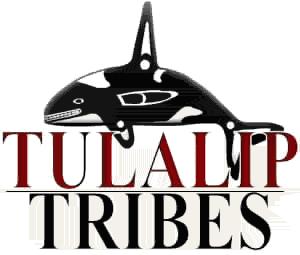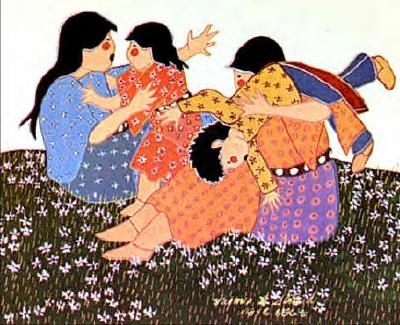 No lectures, no tutoring. Just someone who wants to hang out. No lectures, no tutoring. Just someone who wants to hang out.
That's what the
Tulalip Mentoring Program promises its 20 middle-school students in the hope these young Native Americans will
change their outlook on school. Healthy friendships with adult volunteers can help cut absenteeism and improve
academic achievement, program administrators say.
In the past two
years, coordinators have paired students at the Tulalip Option School with people like Jorgen Embreus, a 75-year-old
real-estate agent whose journey with 14-year-old Craig Cultee began most memorably.
Blindfolded in the
woods on Whidbey Island, Embreus found his hand being grasped by Cultee during an exercise to build trust. Cultee
led him through knotted brush, ahead of other pairs of students and blindfolded adults.
"I thought,
`My God, what a wonderful guy,' " Embreus said of Cultee. "He doesn't say much, but he takes control."
Embreus has discovered
other such qualities in Cultee, and the two have formed a special bond since that first encounter.
A former cowboy,
big-game guide and land surveyor, Embreus encourages the artistic side of Cultee, who has a talent for carving.
But he takes no
credit. "I have done very, very little. It's like I'm the little match that makes the big fire burn. The big
fire is this boy," he said.
Many of the students
in the program are lagging behind their grade level because of poor attendance, learning disabilities and other
problems. The Tulalip Option School, part of the Marysville School District, is an alternative middle school on
the reservation.
While some students
attend the school because of its close cultural ties to the Tulalip Tribes, a number are there because they haven't
had success in traditional classrooms. School was a place where they were branded "at risk" because they
didn't succeed academically or fit in culturally. Many are grappling with family histories involving alcohol and
drug abuse or separation from their parents.
Cultee's mother,
Katherine Jackson, said her son has a learning disability and teachers need to repeat lessons to him several times.
He gets frustrated at school. Sometimes he gets angry, she said.
But Embreus' quiet,
easy way has had a lasting effect on her son, and he has matured, Jackson said.
No one is saying
the mentoring program is a panacea for challenges facing some Native American students.
But during the past
two years, absenteeism has dropped and test scores have climbed, said David Asia, a counselor at the Tulalip Option
School.
Friendships with
their mentors raise the students' self-esteem and sometimes give them a reason to show up for school, Asia said.
School officials,
looking at studies on the influence of mentoring, structured their project from elements of other programs, including
one in the Methow Valley School District.
They also drew on
advice from tribal members.
 Far from focusing on the three R's, the students and their mentors have
spent their time learning to carve sticks for salmon roasts or fashioning cedar bracelets and headbands. They've
visited the Royal British Columbia Museum in Victoria. Sometimes they go for walks along the shoreline. Far from focusing on the three R's, the students and their mentors have
spent their time learning to carve sticks for salmon roasts or fashioning cedar bracelets and headbands. They've
visited the Royal British Columbia Museum in Victoria. Sometimes they go for walks along the shoreline.
Cierra Solomon,
13, wondered what she and her mentor, a woman more than twice her age, would talk about.
Within minutes of
their first meeting, Solomon and Lisa Foster, a program coordinator for the Tulalip Public Health and Safety Network,
found they had plenty to gab about: Buffy the Vampire Slayer, professional wrestling, heavy metal, rhythm and blues.
Solomon shares her
dreams with Foster. She wants to be the valedictorian of her high school. She'd like to earn a law degree. She
wants to try sky-diving. She wants to become a professional wrestler.
"They're like
your really old best friend," said Solomon, daughter of Tulalip Tribal Chairman Herman Williams Jr.
And Foster draws
inspiration from her relationship with Solomon.
"My life means
something more," said Foster, 32. "Knowing that there are eyes watching me, that's powerful."
The mentoring program
is a collaboration of the Tulalip Tribes and the Marysville School District. Its budget is $25,000 over two years.
It also receives a number of donated services.
District and tribal
leaders would like to expand the program to the elementary school and the high school on the reservation.
They're looking
for more mentors.
"Basically
everyone wants to support young people," Asia said. "But it's very difficult to find people to give an
hour a week."
Those in the program
say it's worth it. |

 Far from focusing on the three R's, the students and their mentors have
spent their time learning to carve sticks for salmon roasts or fashioning cedar bracelets and headbands. They've
visited the Royal British Columbia Museum in Victoria. Sometimes they go for walks along the shoreline.
Far from focusing on the three R's, the students and their mentors have
spent their time learning to carve sticks for salmon roasts or fashioning cedar bracelets and headbands. They've
visited the Royal British Columbia Museum in Victoria. Sometimes they go for walks along the shoreline.